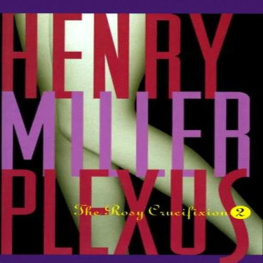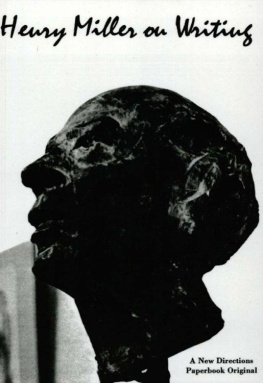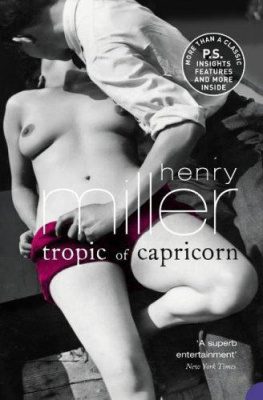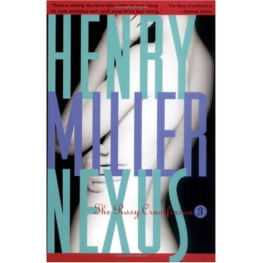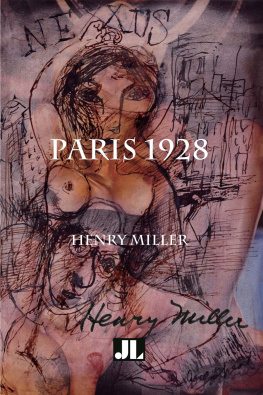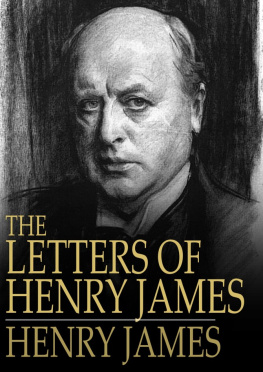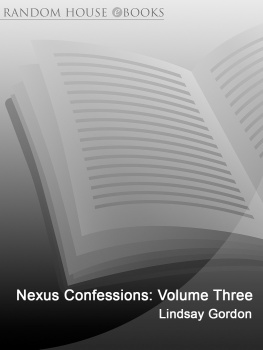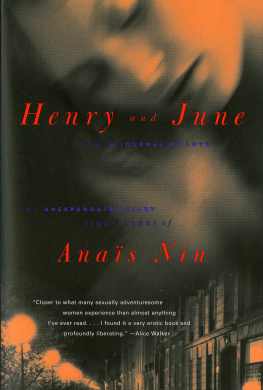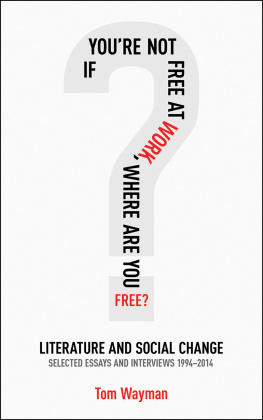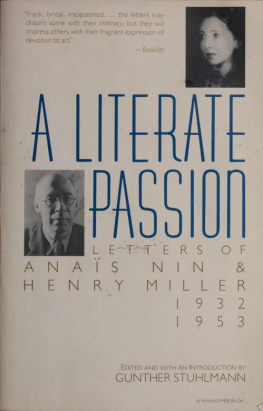Henry Miller - NEXUS
Here you can read online Henry Miller - NEXUS full text of the book (entire story) in english for free. Download pdf and epub, get meaning, cover and reviews about this ebook. genre: Prose. Description of the work, (preface) as well as reviews are available. Best literature library LitArk.com created for fans of good reading and offers a wide selection of genres:
Romance novel
Science fiction
Adventure
Detective
Science
History
Home and family
Prose
Art
Politics
Computer
Non-fiction
Religion
Business
Children
Humor
Choose a favorite category and find really read worthwhile books. Enjoy immersion in the world of imagination, feel the emotions of the characters or learn something new for yourself, make an fascinating discovery.

- Book:
- Author:
- Genre:
- Rating:5 / 5
- Favourites:Add to favourites
- Your mark:
- 100
- 1
- 2
- 3
- 4
- 5
: summary, description and annotation
We offer to read an annotation, description, summary or preface (depends on what the author of the book "" wrote himself). If you haven't found the necessary information about the book — write in the comments, we will try to find it.
— read online for free the complete book (whole text) full work
Below is the text of the book, divided by pages. System saving the place of the last page read, allows you to conveniently read the book "" online for free, without having to search again every time where you left off. Put a bookmark, and you can go to the page where you finished reading at any time.
Font size:
Interval:
Bookmark:
Henry Miller
THE ROSY CRUCIFIXION, BOOK THREE: NEXUS
1
Woof! Woof woof! Woof! Woof!
Barking in the night. Barking, barking. I shriek but no one answers. I scream but there's not even an echo.
Which do you wantthe East of Xerxes or the East of Christ?
Alonewith eczema of the brain.
Alone at last. How marvelous! Only it is not what I expected it to be. If only I were alone with God!
Woof! Woof! woof!
Eyes closed, I summon her image. There it is, floating in the dark, a mask emerging from the spindrift: the Tilla Durieux bouche, like a bow; white, even teeth; eyes dark with mascara, the lids a viscous, glistening blue; hair streaming wild, black as ebony. The actress from the Carpathians and the roof-tops of Vienna. Risen like Venus from the flatlands of Brooklyn.
Woof! Woof woof! Woof! Woof!
I shout, but it sounds for all the world like a whisper.
My name is Isaac Dust. I am in Dante's fifth heaven. Like Strindberg in his delirium, I repeat: What does it matter? Whether one is the only one, or whether one has a rival, what does it matter?
Why do these bizarre names suddenly come to mind? All class-mates from the dear old Alma Mater: Morton Schnadig, William Marvin, Israel Siegel, Bernard Pistner, Louis Schneider, Clarence Donohue, William Overend, John Kurtz, Pat McCaffrey, William Korb, Arthur Convissar, Sally Liebowitz, Frances Glanty ... Not one of them has ever raised his head. Stricken from the ledger. Scotched like vipers.
Are you there, comrades?
No answer.
Is that you, dear August, raising your head in the gloom? Yes, it is Strindberg, the Strindberg with two horns protruding from his forehead. Le cocu magnifique.
In some happy timewhen? how distant? what planet?I used to move from wall to wall greeting this one and that, all old friends: Leon Bakst, Whistler, Lovis Corinth, Breughel the Elder, Botticelli, Bosch, Giotto, Cimabue, Piero della Francesca, Grunewald, Holbein, Lucas Cranach, Van Gogh, Utrillo, Gauguin, Piranesi, Utamaro, Hokusai, Hiroshigeand the Wailing Wall. Goya too, and Turner. Each one had something precious to impart. But particularly Tilla Durieux, she with the eloquent, sensual lips dark as rose petals.
The walls are bare now. Even if they were crowded with masterpieces I would recognize nothing. Darkness has closed in. Like Balzac, I live with imaginary paintings. Even the frames are imaginary.
Isaac Dust, born of the dust and returning to dust. Dust to dust. Add a codicil for old times sake.
Anastasia, alias Hegoroboru, alias Bertha Filigree of Lake Tahoe-Titicaca and the Imperial Court of the Czars, is temporarily in the Observation Ward. She went there of her own accord, to find out if she were in her right mind or not. Saul barks in his delirium, believing he is Isaac Dust. We are snow-bound-in a hall bedroom with a private sink and twin beds. Lightning flashes intermittently. Count Bruga, that darling of a puppet, reposes on the bureau surrounded by Javanese and Tibetan idols. He has the leer of a madman quaffing a bowl of sterno. His wig, made of purple strings, is surmounted by a miniature hat, a la Boheme, imported from la Galerie Dufayel. His back rests against a few choice volumes deposited with us by Stasia before taking off for the asylum. From left to right they read
The Imperial OrgyThe Vatican SwindleA Season in HellDeath in VeniceAnathemaA Hero of our TimeThe Tragic Sense of LifeThe Devil's DictionaryNovember BoughsBeyond the Pleasure PrincipleLysistrataMarius the EpicureanThe Golden AssJude the ObscureThe Mysterious StrangerPeter WhiffleThe Little FlowersVirginibus PuerisqueQueen MabThe Great God PanThe Travels of Marco PoloSongs of BilitisThe Unknown Life of JesusTristram ShandyThe Crock of GoldBlack BryonyThe Root and the Flower.
Only a single lacuna: Rozanov's Metaphysics of Sex.
In her own handwriting (on a slip of butcher's paper) I find the following, a quotation obviously, from one of the volumes: That strange thinker, N. Federov, a Russian of the Russians, will found his own original form of anarchism, one hostile to the State.
Were I to show this to Kronski he would run immediately to the bughouse and offer it as proof. Proof of what? Proof that Stasia is in her right mind.
Yesterday was it? Yes, yesterday, about four in the morning, while walking to the subway station to look for Mona, who should I spy sauntering leisurely through the drifting snow but Mona and her wrestler friend Jim Driscoll. You would think, to see them, that they were looking for violets in a golden meadow. No thought of snow or ice, no concern for the polar blasts from the river, no fear of God or man. Just strolling along, laughing, talking, humming. Free as meadow-larks.
Hark, hark, the lark at heaven's gate sings!
I followed them a distance, almost infected myself by their utter nonchalance. Suddenly I took an oblique left turn in the direction of Osiecki's flat. His chambers, I should say. Sure enough, the lights were on and the pianola softly giving out morceaux choisis de Dohnanyi.
Hail to you, sweet lice, I thought, and passed on. A mist was rising over toward Gowanus Canal. Probably a glacier melting.
Arriving home I found her creaming her face.
Where in God's name have you been? she demands, almost accusingly.
Are you back long? I counter.
Hours ago.
Strange. I could have sworn that I left here only twenty minutes ago. Maybe I've been walking in my sleep. It's funny, but I had a notion I saw you and Jim Driscoll walking arm in arm...
Val, you must be ill.
No, just inebriated. I mean ... hallucinated.
She puts a cold hand on my brow, feels my pulse. Everything normal, apparently. It baffles her. Why do I invent such stories? Just to torment her? Isn't there enough to worry about, with Stasia in the asylum and the rent overdue? I ought to have more consideration.
I walk over to the alarm clock and point to the hands. Six o'clock.
I know, she says.
So it wasn't you I saw just a few minutes ago?
She looks at me as if I were on the verge of dementia.
Nothing to worry about, dearie, I chirp. I've been drinking champagne all night. I'm sure now it wasn't you I sawit was your astral body. Pause. Anyway, Stasia's O.K. I just had a long talk with one of the internes...
You ... ?
Yes, for want of anything better to do I thought I'd run over and see how she was getting along. I brought her some Charlotte russe.
You should get to bed, Val, you're exhausted. Pause. If you want to know why I'm so late I'll tell you. I just left Stasia. I got her out about three hours ago. She began to chuckleor was it to cackle? I'll tell you all about it to-morrow. It's a long story.
To her amazement I replied: Don't bother, I heard all about it a little while ago.
We switched out the lights and crawled into bed. I could hear her laughing to herself.
As a good-night fillip I whispered: Bertha Filigree of Lake Titicaca.
Often, after a session with Spengler or Elie Faure, I would throw myself on the bed fully clothed and, instead of musing about ancient cultures, I would find myself groping through a labyrinthian world of fabrications. Neither of them seems capable of telling the truth, even about such a simple matter as going to the toilet. Stasia, an essentially truthful soul, acquired the habit in order to please Mona. Even in that fanciful tale about being a Romanoff bastard there was a grain of truth. With her it's never a lie out of the whole cloth, as with Mona. Moreover, should one confront her with the truth, she does not throw an hysterical fit or stalk out of the room on stilts. No, she simply breaks into a broad grin which gradually softens into the pleasing smile of an angelic child. There are moments when I believe I can get somewhere with Stasia. But just when I sense that the time is ripe, like an animal protecting her cub, Mona whisks her off.
Font size:
Interval:
Bookmark:
Similar books «»
Look at similar books to . We have selected literature similar in name and meaning in the hope of providing readers with more options to find new, interesting, not yet read works.
Discussion, reviews of the book and just readers' own opinions. Leave your comments, write what you think about the work, its meaning or the main characters. Specify what exactly you liked and what you didn't like, and why you think so.

